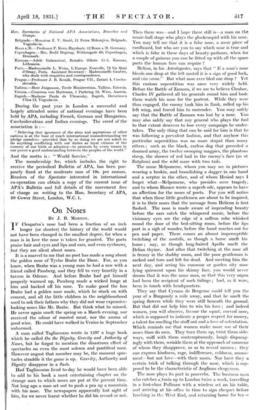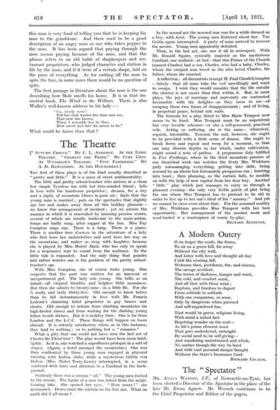On Noses
By J. B. MORTON.
IF Cleopatra's nose had been a fraction of an inch longer (or shorter) the history of the world would not have been changed in the smallest degree, for when a man is in love the nose is taken for granted. The poets praise hair and eyes and lips and ears, and even eyebrows, )but they are silent about noses. It is a marvel to me that no poet has made a song about the golden nose of Tycho Brahe the Dane. For, as you know, when Brahe was a young man he had a row with a friend called Passberg, and they fell to very heartily in a tavern in Odense. And before Brahe had got himself properly warmed up, Passberg made a wicked lunge at him and hacked off his nose. To make good the loss Brahe had a golden nose made, which he stuck on with cement, and all the little children in the neighbourhood used to ask their fathers why they did not wear expensive- looking noses like Mr. Brahe. But think what he missed. He never again smelt the spring on a March evening, nor received the odour of roasted meat, nor the aroma of good wine. He could have walked in Venice in September unharmed.
A man called Tagliacozzo wrote in 1597 a huge book which he called On the Dignity, Gravity and Authority of Noses, but he forgot to mention the disastrous effect of spectacles on even the most solemn and pontifical nose. However august that member may be, the moment spec- tacles straddle it the game is up. Gravity, Authority and Dignity disappear in a flash. Had Tagliacozzo lived to-day he would have been able to add to his book a most entertaining chapter on the strange uses to which noses are put at the present time. Not long ago a man set out to push a pea up a mountain with his nose. The newspapers apparently lost sight of him, for we never learnt whether he did his record or not. Then there was—and I hope there still is—a man on the music-hall stage who plays the glockenspiel with his nose.
You may tell me that it is a false nose, a mere piece of cardboard, but who are you to say which nose is true and which is false in these days of beauty-parlours, when for a couple of guineas you can be fitted up with all the spare parts the human face can require ?
Melton, in his Astrologaster, says that " If a man's nose bleeds one drop at the left nostril it is a sign of good luck, and vice versa." But what nose ever bled one drop ? Yet this curious superstition was once very widely held. Before the Battle of Zamora, if we are to believe Clenhoe, Charles IV gathered all his generals round him and bade them watch his nose for the portent. While they were thus engaged, the enemy took him in flank, rolled up his left wing, and forced him to surrender. You may safely say that the Battle of Zamora was lost by a nose. You may also safely say that any general who plays the fool to that extent deserves to lose every campaign he under- takes. The only thing that can be said for him is that he was following a prevalent fashion, and that anyhow this particular superstition was no more stupid than many others ; such as the black, earless dog that preceded a doomed army, the twelve swooping magpies, the phantom sheep, the shower of red hail in the enemy's face (as at Zutphen) and the wild mare with two tails.
The muse Melpomene, whom you may see in pictures wearing a buskin, and brandishing a dagger in one hand and a sceptre in the other, and of whom Hesiod says I forget what—Melpomene, who presides over tragedy, and to whom Horace wrote a superb ode, appears to have an affection for the noses of poets. For you will notice that when these little gentlemen are about to be inspired, it is to their noses that the message from Helicon is first flashed. The nose is made aware of impending beauty before the ears catch the whispered music, before the visionary eyes see the edge of a saffron robe whisked round the door of the bed-sitting room, before the lips part in a sigh of wonder, before the hand reaches out for pen and paper. There comes an almost imperceptible twitching of the nostrils, as though a horse smelt his home ; nay, as though long-haired Apollo smelt the Delian thyme. And after that twitching at the nose all is frenzy in the shabby room, and the poor gentleman is racked and torn and left for dead. And meeting him the next day, and seeing his common or garden city nose lying quiescent upon his skinny face, you would never dream that it was the same man, or that this very organ had been the recipient of such tidings ; had, as it were, been in touch with headquarters.
They say that Cyrano de Bergerac could tell you the year of a Burgundy a mile away, and that he smelt the spring flowers while they were still beneath the ground.
But that did not help him to win his love ; and indeed women, you will observe, favour the squat, curved nose, which is supposed to indicate a proper respect for money, a talent for smelling the stuff out and a love of ostentation. Which reminds me that women make more use of their noses than do men. They turn them up, twist them side- ways, sniff with them contemptuously, laugh disparag- ingly with them, wrinkle them at the approach of someone of whom they disapprove, so as to reveal nausea ; they can express kindness, rage, indifference, coldness, amuse- ment—but not love—with their noses. Nor have they a certain trick of talking through the nose, which is sup- posed to be the characteristic of Anglican clergymen.
The nose plays its part in proverbs. The business man who catches a,train up to London twice a week, travelling in a first-class Pullman with a wireless set on his table, and arriving at his office in time to sign cheques before lunching in the West End, and returning home for tea-- this man is very fond of telling you that he is keeping his nose to the grindstone. And there used to be a good description of an angry man as one who takes pepper in the nose. It has been argued that paying through the nose means paying because of the nose, and that the phrase refers to an old habit of shopkeepers and res- taurant proprietors, who judged character and station in life by the nose, and if it were of a certain shape, laid on the price of everything. As for cutting off the nose to spite the face, in some cases there would be no question of spite.
The best passage in literature about the nose is the one describing how Mole smells his home. It is in that im- mortal book, The Wind in the Willows. There is also Waller's well-known address to his lady :— " Go, lovely nose !
Tell her that wastes her time and me, That now she knows, When I resemble her to thee, How sweet and fair she seems to be."
What could be fairer than that ?















































 Previous page
Previous page